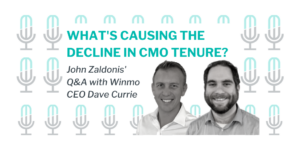
What’s Causing the Decline in CMO Tenure? Q&A with Winmo CEO Dave Currie
Winmo CEO, Dave Currie, made his Win More podcast debut on Monday (episode #187!). Host John Zaldonis sat down with Dave to discuss “CMOs’ Time in Their Posts Continues to Grow Shorter,” a thought-provoking Wall Street Journal article by Nat Ives. Read their interview below to uncover why there’s a significant decline in CMO tenure.
John Zaldonis: The title of the article clearly indicates Ives’ findings. Why was it so important to draw extra attention to this subject?
Dave Currie: For three reasons.
- Changes in marketing leadership are a key sales intelligence trigger for agencies, media, sponsorship, and adtech sales professionals looking to establish new relationships.
- My team at Winmo tracks the marketing campaigns, media spend, agency relationships, and tenure of every national and emerging advertiser’s CMO on a daily basis. Then, we alert our customers to take action well ahead of their competition.
- Constant CMO turnover impacts a plethora of downstream business relationships, opportunities, and investments. The greater the rate of change, the greater the number of new business opportunities we’re able to present to our customers.
JZ: In the piece, Ives says, “Top marketers have been under pressure for a while to justify their work, and aren’t always given the runway that other executives get.” This is a phenomenon we’ve touched on the podcast before now, most recently with Samantha. But why does that happen?
DC: Let’s put this into context. If we just look at the CMOs of the top national advertisers, the companies are often hierarchical organizations with established marketing processes and practices. It’s difficult for a CMO to change those processes and quickly impact the business. Especially when you compare large brands with what can be achieved and measured at more nimble, challenger brands.
Also, there’s a ‘play it safe’ attitude when leading a portfolio of top nationals brands as a guardian, rather than a high growth pirate set to capture SOV or market share. Of course, we also can’t overlook shortened consumer attention spans and technology’s impact in this sector. The bottom line for our Winmo customers and listeners is that the shortened runway that CMOs see when compared to other executives, requires help to achieve desired business outcomes faster. More pressure all around. And there will be less time to identify, build, and nurture more relationships with the CMO and the brand.
JZ: Another trend the piece touches on is the evolution of CMOs. Ives’ quotes Suzy Deering, current CMO of Ford and formerly of eBay, who observed “There used to be a time that marketing was thought of as pretty pictures and storytelling.” She continues that she now sees it as “an orchestrator for the business.”
Do you agree with her? If so, do you see the role continuing to evolve with relative rapidity? Will there ever be stability in what is asked of a CMO?
DC: Effective marketing has always impacted or solved business problems. The fundamentals of this function haven’t changed at all. What has changed, however, is the scope of business problems that marketing helps solve, as well as the attribution, measurement, and speed at which these problems present themselves and are expected to be fixed.
At Winmo, my team predicts that CMO tenure will likely flatten out this year as stability and optimism return to the market. The initiatives and campaigns paused over the last year will kick off and yield more favorable results.
In terms of what is asked of a CMO—the ask today is more akin to a Chief Growth Officer—a shift we’ve seen in title for a while now. The role is more aligned with the CTO and CIO, especially as first-party customer data and the application of it play such a large role in marketing. For listeners, this is important for you to internalize and take action on, too. With increased expectations of the CMO, comes an increased expectation of you, your expertise, and your pragmatic approach to problem-solving. Be prepared for that.
JZ: There’s the evolution of other C-suite roles to consider, as well. On LinkedIn, you mentioned the expanded scope of a Chief Growth Officer as a potential friction point for CMOs. Do you see other in-house impediments?
DC: I see it as an opportunity for savvy marketers and their partners, not a constraint. Expanded scope allows for expanded impact. And with that can come fame and glory for those who step up to the challenge.
JZ: Your post got some great responses that I want to highlight. Kelly McDonald, CEO of Kyndoo.ai, posits that “most CMOs have failed to evolve with the changing landscape of marketing. They operate under the assumption that the marketing landscape exists as it did 20 years ago.”
What would you say to that? What’s your advice for those looking to evolve?
DC: Kelly’s right in some regard. Like all professional roles, there are those who don’t keep up with the rate of change in their industry as they should. Marketing roles are no different. For those not proactive in their professional development, evolution will do its thing. For marketers and their suppliers, vendors, partners, today’s environment will expedite it.
JZ: Our friend Rick Nichols, TechCXO LLC’s managing partner, points out that “many CEOs don’t comprehend the degree of complexity and sophistication needed in an omnichannel digital world.”
Do you foresee that changing? Could there be a future inflection point that causes more CEOs to recognize this blind spot?
DC: Today’s consumers expect and demand more with decreasing levels of patience. As do the shareholders of the supply side companies. Brands and their executive teams who truly understand keep winning. Those who don’t and aren’t open to change will be replaced. Call it disruption or transformation, the best business practitioners and their partners win.
JZ: CEO Marilois Snowman at Mediastruction has a theory that CMO tenure correlates to stock value patience, which is something that Ives hints at in the piece, as well. Last year, as soon as the pandemic hit, the conventional wisdom was to expect volatility in the stock market.
Why is that still tied to CMO tenure? Isn’t that, as Marilois says, irrational?
DC: It’s bigger than stock price, but I believe as we just noted that it is likely a contributing factor. Performance marketing with a greater ability to tie investment to business impact allows high and low execution performance to be seen like never before. This is more likely the culprit.
JZ: Chief Commercial Officer at Global Sports Initiatives, Lee Zohlman, identifies the culprit as the ever-shortening consumer attention span. And a “need to deliver results in a rapidly evolving and technology-based purchasing environment.”
Could it just be that ideas are getting stale at a faster clip? Do we need a new perspective to maintain a connection with a fickle audience?
DC: Certainly. I agree with our Winmo agency partners and our internal analysts that there’s no shortage of great ideas to solve business challenges. However, execution and performance need to better match the environment than even 18 months ago.
JZ: Last question. And it’s the $1M question, at that. Where does this end? Is there a point where this trend will level off? Or will there be a future reversal where the average tenure will expand?
DC: Generally speaking, fluctuation in CMO tenure will ebb and flow with market conditions. Now, at the front end of a new cycle, we forecast tenure to stabilize and increase. On an individual basis, it’s survival of the fittest. We’ve seen the environment shake out the few who couldn’t adapt to the demons of market conditions. And we’ll see who thrives.




